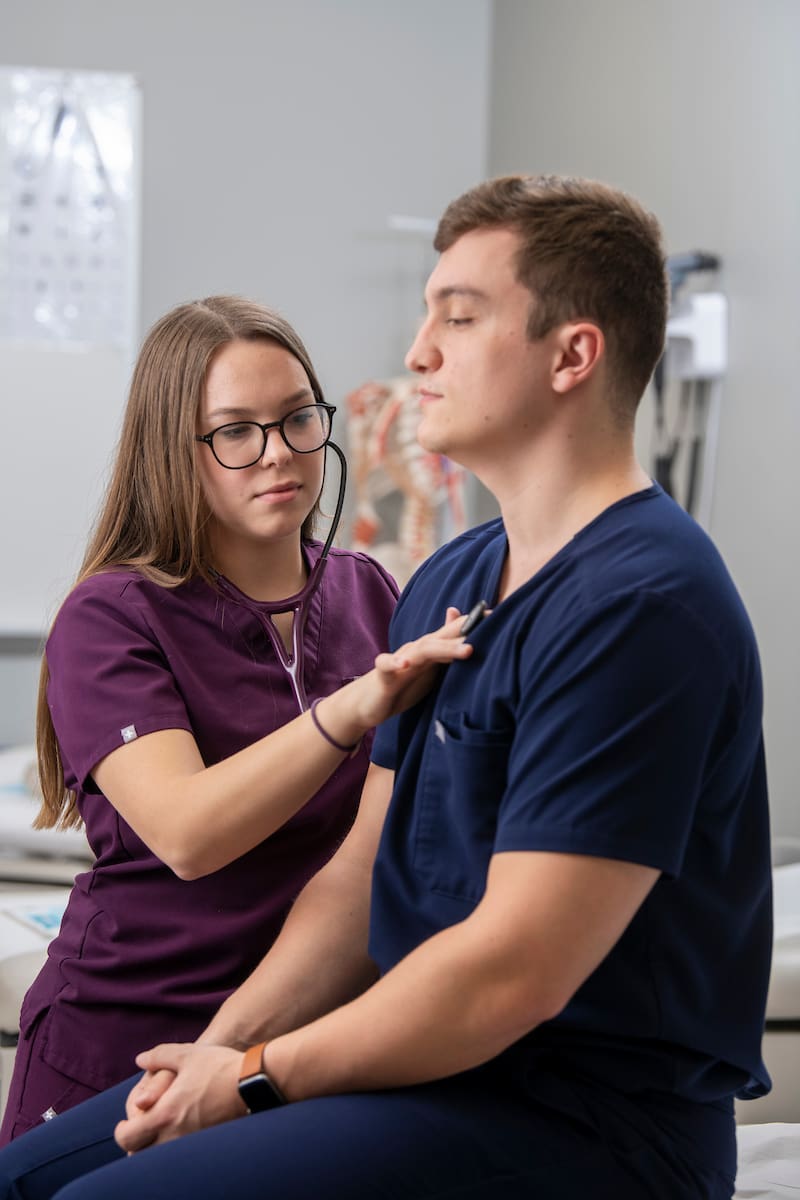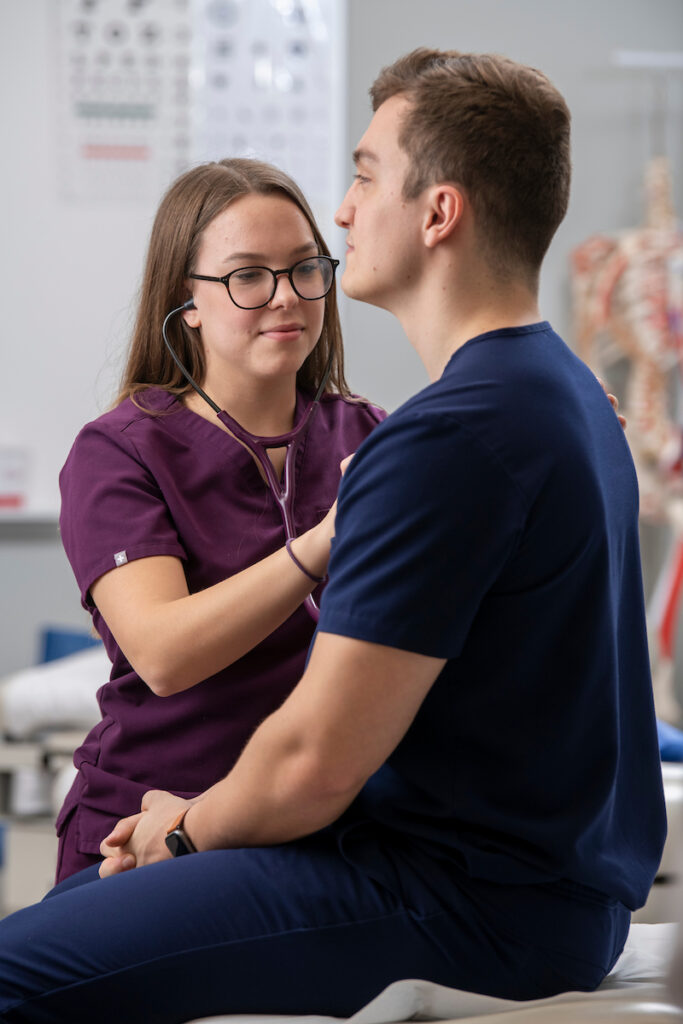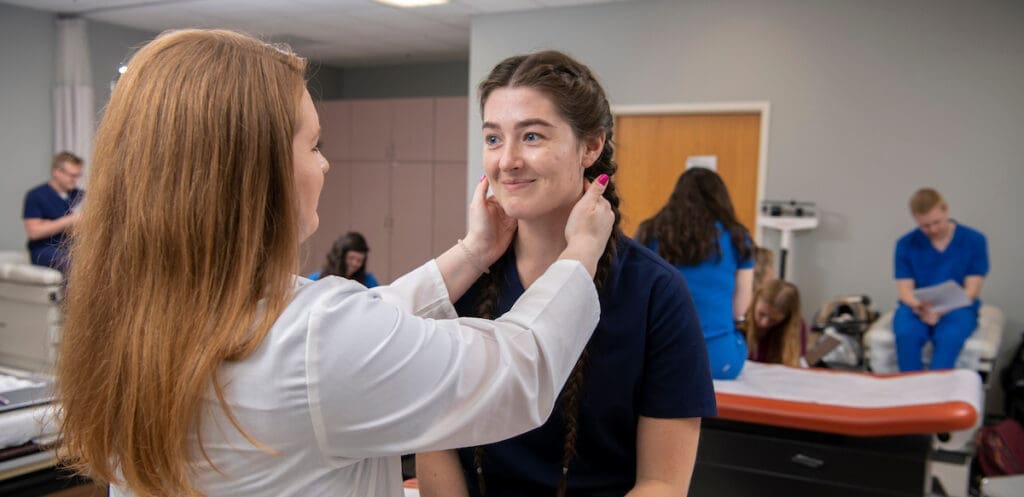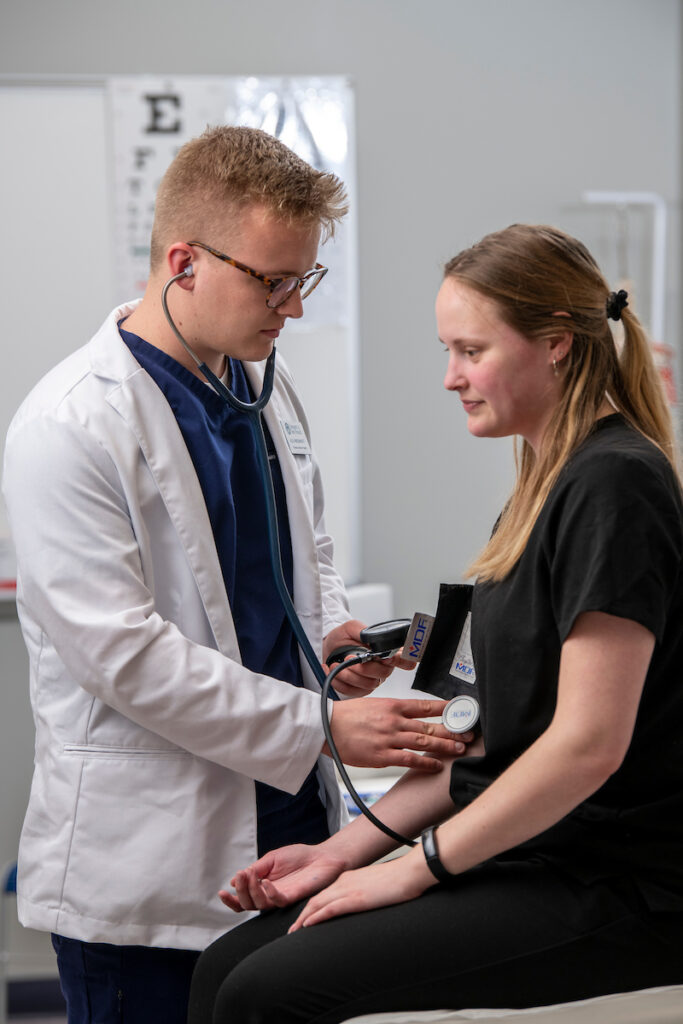Physician Assistant Studies (MS)
Prepare to become a compassionate, competent healthcare provider in one of today’s fastest-growing professions.
- Degrees/Options
- Master of Science
- Length
- 27 months
- Locations
- Fort Wayne

Why Major in Physician Assistant Studies?
A national doctor shortage has created an unprecedented demand for physician assistants and nurse practitioners. As part of a team of doctors, surgeons, or other healthcare providers, physician assistants (PAs) can examine, diagnose and treat patients.
In rural and medically underserved communities, PAs often serve as a primary care provider in close collaboration with a physician — this capability is one reason PAs have become one of the nation’s fastest-growing professions.
Physician Assistant is Ranked One of the Nation’s Top Careers
Physician assistant is ranked #9 on the U.S. Department of Labor’s 20 Fastest Growing Occupations list for 2019-2029. In its Best Jobs publication, U.S. News and World Report also ranks PA among the best careers to pursue; among the honors:
- #2 – Best Healthcare Jobs
- #3 – Best 100 Jobs
- #3 – Best STEM Jobs
How to Become a Physician Assistant
To become a physician assistant, you first need to earn a master’s degree from a program accredited by the Accreditation Review Commission on Education for the Physician Assistant (ARC-PA). Once you have your degree, you’ll be eligible to sit for the Physician Assistant National Certifying Examination (PANCE).
For those looking to further elevate their expertise beyond the master’s level, the University of Saint Francis also offers a Doctor of Medical Science (DMSc) program.
28%
Increase in demand for physician assistants expected through 2031
BLS.gov
95%
Saint Francis first-time pass rate on the Physician Assistant National Certifying Exam — higher than the national average for PA programs
$121,530
median annual salary for physician assistants in Indiana
BLS.gov
Why Saint Francis for Physician Assistant Studies?
The University of Saint Francis is renowned for its healthcare education, and that includes our nationally recognized physician assistant master’s program, located exclusively on the Fort Wayne campus. Our graduates are continually sought out by employers, not just for their sound clinical reasoning skills and competency in evidence-based medicine, but also for the high level of compassion and integrity they bring to their roles.
Saint Francis’s strong academics are rooted in the Catholic tradition of treating everyone with respect and kindness, a practice that aligns perfectly with both the medical credo and the PA program’s focus on underserved populations.
Expert Faculty and Innovative Facilities
If you’re looking for physician assistant students on our campus, you will likely find them engaged in active learning settings designed to strengthen their critical thinking and clinical reasoning skills. Our innovative learning experiences include:
- The Saint Francis Simulation Laboratory (SIM Lab for short)
- The Doermer Family Foundation Immersive Learning Laboratory
- An active learning classroom designed for small groups
- A cadaver laboratory for human anatomy
- A resource lab with patient units and exam rooms
- High-fidelity and mid-fidelity patient simulators
- State-of-the-art instruments and equipment
You will learn from award-winning faculty, including clinicians from a variety of medical specialties. The real-world experience they bring from their professional lives to the classroom will prove invaluable to your Saint Francis experience.
Extensive Clinical Experience and Specialty Elective Options
The best PA programs offer robust and outstanding clinical experiences that will develop you into a well-rounded healthcare professional. With more than 1,000 clinical education partners throughout our region, Saint Francis will help you find rotation sites that align with your goals.
All students must complete rotations in the following required disciplines:
- Family medicine
- Internal medicine
- Surgery
- Emergency medicine
- Pediatrics
- Women’s Health, including Prenatal and Gynecologic Care
- Behavioral and mental health
Additional Specialty Rotations
You’ll have the flexibility to choose three additional rotations from one of the following four electives based on your professional goals. Your elective options – as well as subspecialties and provider types – include:
Trauma/Surgery
- Outpatient Clinic/Occupational Medicine
- Surgery Subspecialties
- Trauma Emergency Medicine
- Medical Office Orthopedics
- Radiology
Hospital Inpatient Care
- Cardiology
- Pulmonology
- Oncology
- Intensive Critical Care Unit
- Neurology
- Gastroenterology
Family Practice
- Pediatrics (additional 2.5 weeks)
- Geriatrics
- Women’s Health, including Prenatal and Gynecologic Care (additional 2.5 weeks)
- Psychiatry (additional 2.5 weeks)
- Urgent Care
Internal Medicine
- Cardiology
- Pulmonology
- Neurology
- Nephrology
- Gastroenterology
- Endocrinology
- Rheumatology
Campus and Community Involvement
Saint Francis is home to campus ministries, student groups, and service organizations. Among these clubs is the PA Student Society, which offers social, educational and networking opportunities to members and the greater campus community.
What Can You Do With a Degree in Physician Assistant Studies?
Most students pursue a PA degree to provide patient care as part of a medical team, and more than 40% work in a hospital. With the variety of specialties and subspecialties available to PAs, you’ll find these professionals in almost every medical setting, from a private practice to a large healthcare system.
The three most common areas of practice, according to the National Commission on Certification of Physician Assistants, are:
- Surgical subspecialties (18.7%)
- Family medicine/general practice (18.6%)
- Emergency medicine (12.8%)
Some of the more unique places you can practice as a physician assistant: schools, colleges, correctional facilities, retail clinics, and telehealth providers.
Others might wonder how to become a physician assistant who works in a non-clinical setting, such as in research or public health. The American Academy of PAs states that physician assistants can use their background to work for biotechnology, pharmaceutical and medical device companies; to work in medical writing, healthcare communications and public policy; or to teach the next generation of PAs.
Where You’ll Find Our Graduates
Saint Francis physician assistant studies graduates demonstrate the diversity of this field, practicing medicine at places such as:
- Ascension
- Avera McKennan Hospital & University Health Center
- Beacon Health System
- Beaumont Urgent Care
- Beloit Hospital
- BMG Orthopedics
- Carle Foundation Hospital
- Cleveland Clinic
- Colon & Rectal Surgery Associates
- Credo Family Medicine
- Decatur Health Services
- Ear, Nose & Throat Associates
- First Choice Medical
- Genesis Convenient Care
- Gunderson Health System
- Hamilton Community Health Network
- Hospitalist Physicians Medical Group of Michigan
- Johns Hopkins Hospital
- Mayo Clinic Health Systems
- McLaren Medical Group
- Mercy Health Ohio
- MercyOne Waukee Family Medicine
- MidMichigan Urgent Care
- San Juan Neurosurgery Spine Center
- Southern Indiana Nephrology & Hypertension
- Spectrum Health
- St. Vincent Health
- University of Utah Health
- West Michigan Cancer Center & Institute for Blood Disorders



Accreditation
The Accreditation Review Commission on Education for the Physician Assistant, Inc. (ARC-PA) has granted Accreditation-Continued status to the University of Saint Francis Fort Wayne Physician Assistant Program sponsored by University of Saint Francis. Accreditation-Continued is an accreditation status granted when a currently accredited program is in compliance with the ARC-PA Standards.
Accreditation remains in effect until the program closes or withdraws from the accreditation process or until accreditation is withdrawn for failure to comply with the Standards. The approximate date for the next validation review of the program by the ARC-PA will be March 2034. The review date is contingent upon continued compliance with the Accreditation Standards and ARC-PA policy.
The program’s accreditation history can be viewed on the ARC-PA website at https://www.arc-pa.org/accreditation-history-university-of-st-francis-in/.
Mission Statement
The Physician Assistant Program impassions a community of lifelong learners to become academically and professionally competent, service-oriented, and patient-centered clinicians capable of caring for diverse individuals in a variety of medical settings through innovative and evidence-based practices.
Vision Statement
The Physician Assistant Program aspires to cultivate an interactive, collaborative, and service-centered community capable of fostering enhanced clinical reasoning and critical thinking skills in education and the practice of medicine while promoting flourishing in self and others.
Since the MS in Physician Assistant Studies curriculum was implemented with the class of 2004, 451 Saint Francis graduates have taken the Physician Assistant National Certifying Exam (PANCE). Of those 451, 440 passed on the first attempt (98%). The National Commission on Certification of Physician Assistants (NCCPA) provides a NCCPA PANCE Pass Rate Summary Report that displays first-time Graduate Performance on Certification Exam results by exam administration year. The program report below demonstrates Saint Francis first-time pass rate by graduation cohort since 2008.
| Graduation Year | USF First-Time Pass Rate | USF Aggregate Pass Rate | National First-Time Pass Rate |
|---|---|---|---|
| 2023 | 94% | 100% | 92% |
| 2022 | 100% | 100% | 92% |
| 2021 | 92% | 100% | 93% |
| 2020 | 92% | 100% | 95% |
| 2019 | 95% | 100% | 93% |
| 2018 | 96% | 100% | 98% |
| 2017 | 100% | 100% | 97% |
| 2016 | 100% | 100% | 96% |
| 2015 | 100% | 100% | 96% |
| 2014 | 100% | 100% | 95% |
| 2013 | 100% | 100% | 94% |
| 2012 | 100% | 100% | 93% |
| 2011 | 100% | 100% | 91% |
| 2010 | 100% | 100% | 94% |
| 2009 | 95% | 100% | 92% |
| 2008 | 100% | 100% | 94% |
Please view the following pages for information related to admissions policies, procedures, and enrollment technical standards.
- Admissions and Enrollment Policies and Procedures
- Policy Regarding Advanced Placement
- Articulation Agreement with Goshen College
- Articulation Agreement with Huntington University
- Articulation Agreement with Indiana Wesleyan University
- Articulation Agreement with Indiana Tech
- Articulation Agreement with Manchester University
Cost of Tuition
Please view the following pages for information related to specific program policies and procedures.
The program’s most recent attrition rates are readily available for prospective students.